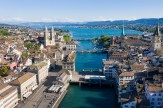What is in the JFK files? Hear from one historian about whether there
were any new revelations
We asked Edward H. Miller, a teaching professor and political historian, about whether there is any new information in the trove of documents concerning JFK’s assassination.

The release of documents related to the assassination of President John F. Kennedy in recent days offered some new tidbits and odds and ends, but nothing to change one historian’s view that Lee Harvey Oswald was the sole assassin.
Edward H. Miller, a teaching professor and political historian who focuses on the way U.S. history is perceived worldwide, says the release provides a degree of transparency, but at the cost of divulging secrets behind U.S. covert operations and — in some instances — the Social Security numbers of congressional employees living and dead.
In keeping with a campaign promise, President Donald Trump made a trove of documents related to the assassination of President John F. Kennedy public last week. The more than 63,000 documents can now be viewed on the U.S. National Archives and Records Administration website.
Kennedy was shot and killed in Dallas in 1963 while in a motorcade alongside first lady Jacqueline Kennedy and Texas Governor John Connally, who was seriously wounded during the shooting. The Warren Commission, convened by President Lyndon B. Johnson in the aftermath of the assassination, concluded that Lee Harvey Oswald, a former Marine, carried out the killing — and acted alone.
The Warren Report’s conclusions, though controversial at the time, have more or less come to represent the official history, Miller says.

There was a growing public hunger for more information, touched off, Miller says, by a 1966 book by American attorney Mark Lane titled “Rush to Judgment: A Critique of the Warren Commission’s Inquiry into the Murders of President John F. Kennedy, Officer J.D. Tippit and Lee Harvey Oswald.”
Congress subsequently convened the House Select Committee on Assassinations in 1977, the conclusions of which famously suggested a “probable conspiracy” in Kennedy’s death The release of documents related to the assassination of President John F. Kennedy offered some new tidbits and odds and ends, but nothing to change one historian’s view that Lee Harvey Oswald was the sole assassin.
Trump’s executive order states that “it is in the national interest to finally release all records related to these assassinations without delay.”
Northeastern Global News spoke to Miller about whether there is any new information in the trove of documents related to JFK’s assassination that would alter our understanding of history.
His comments have been edited for brevity and clarity.
Editor’s Picks
I know it took you some time to digest these documents. What did you find? Is there anything new or surprising?
There’s some interesting tidbits, but nothing memorable. There really isn’t anything new. Also, the documents are difficult to read because there are no citations. It certainly feels like it’s been put out in a hurried way: a lot of sensitive information, like Social Security numbers, were put out, et cetera. As to the substance, I remain staunchly in the “Oswald did it” camp.
I think the impulse toward transparency here is great; but at the same time, we do have to protect our nation’s secrets from bad actors. It does also raise the question of why this wasn’t addressed earlier — and with a little bit more transparency. That way we wouldn’t have this persistent problem of folks going down the rabbit holes of misinformation that we see on social media.
What is your view on the assassination and how it unfolded?
My view is that Oswald was a troubled, narcissistic individual who had an opportunity to change history — and he did. It marked a sudden end to the thousand days of Camelot, as Kennedy’s presidency was sometimes referred to. It was an awful event, no doubt. And I think the obsession with needing more answers speaks to the question of how such a small individual, in historical terms, could strike down a great leader at the height of his powers. I think that’s the source of so much conspiracy-mongering. I know that’s a bit of a hoary explanation — but in all likelihood, it is the correct one.
It comes down to Occam’s razor: you cut through all the noise, and it comes down to the fact that this individual [Oswald] was able to assassinate the president on the third attempt. But he had an opportunity and, the story goes, he missed the first two shots, and the last shot was the terrible headshot. I think the story is as simple as that.
How did Kennedy’s death change the course of history?
It did impact things, and in ways maybe not expected. For instance, Lyndon Johnson passed the Civil Rights Act of 1964, and Kennedy might have had some trouble getting something like that through Congress. He certainly didn’t have the legislative acumen that Johnson had (he was often called the “Master of the Senate”). Johnson also helped oversee the passage of Immigration and Nationality Act of 1965, then the Civil Rights Act of 1968. Who knows what Kennedy would have done with the Vietnam War, but of course we’ll never have the answer to that question.
How do you think the disclosure of these documents will impact public opinion on the assassination?
It’s hard to say. But now actually the numbers are rising in terms of the number of people who think Oswald did it. Who knows? But I hope now’s the time that people put some of these conspiracy theories to rest.












